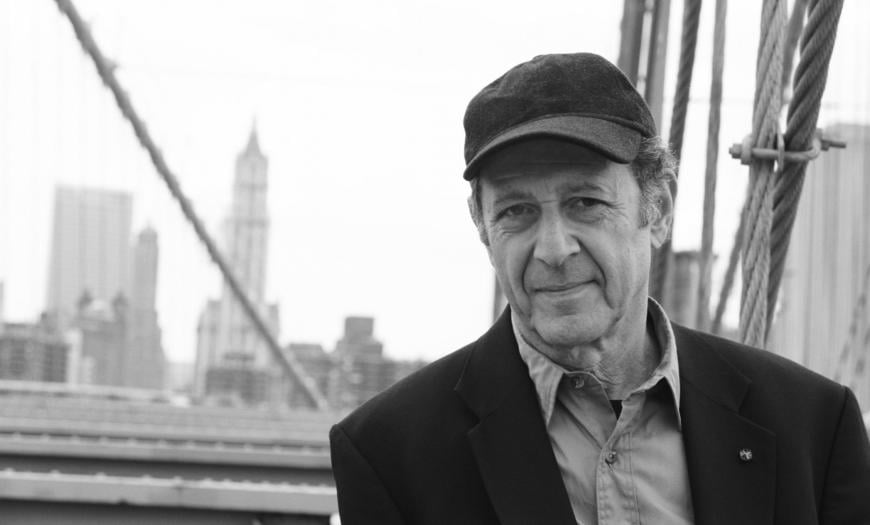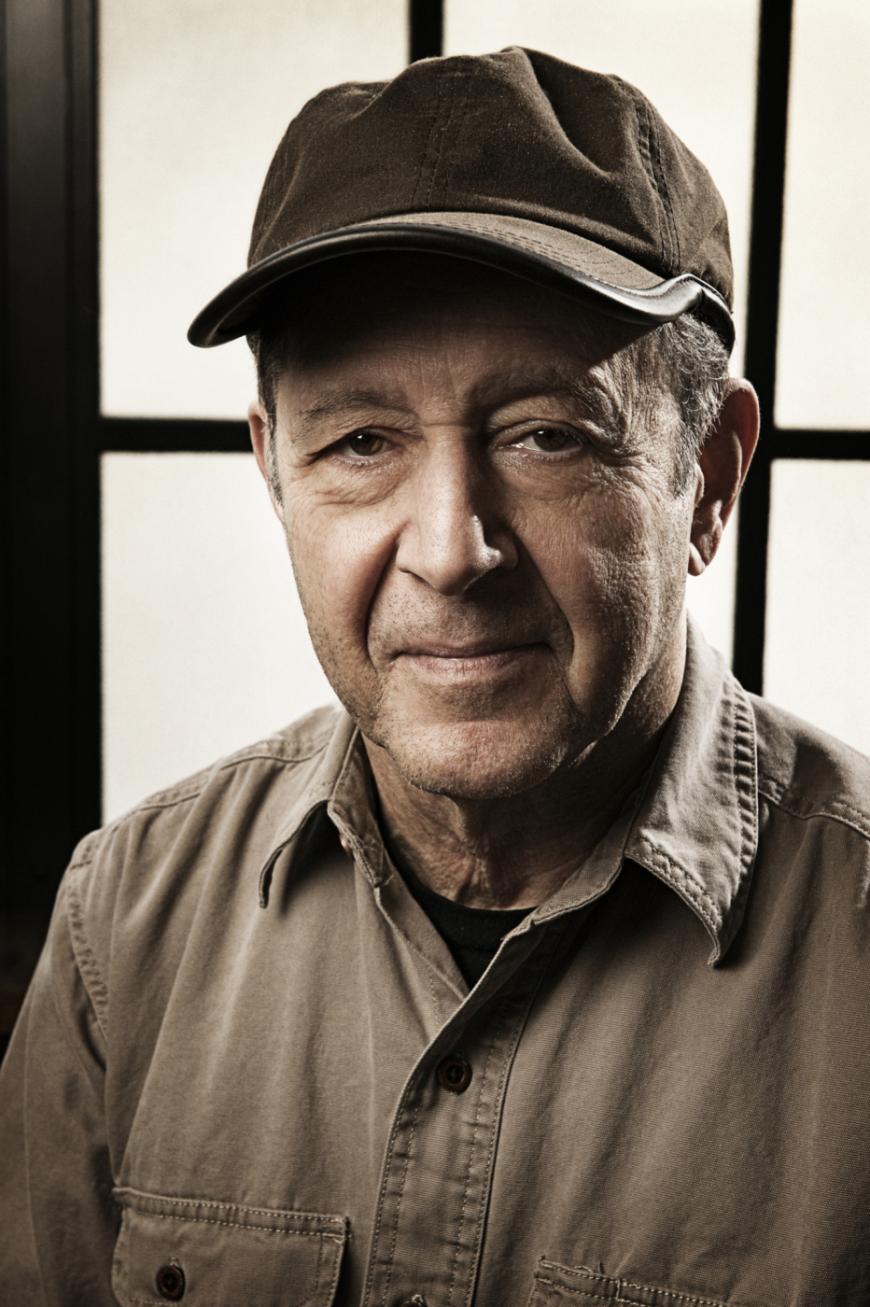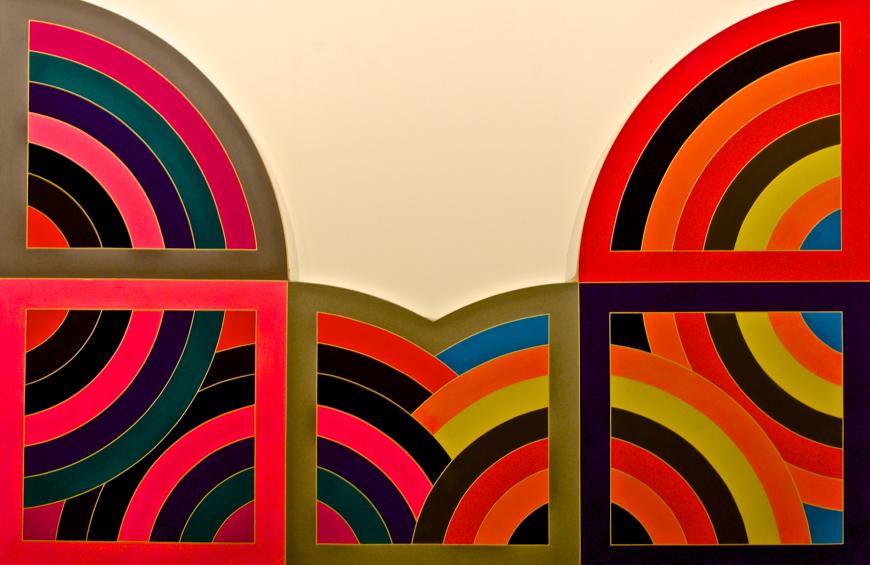
Steve Reich isn’t crazy about the term “minimalism.” But he’s made his peace with it.
“In the early days, there was the possibility it would be called ‘trance music,’” he said. “So the name could have been worse.”
Whatever you want to call it, Reich, along with his friends and fellow composers Philip Glass and Terry Riley, created a new style of classical music in the 1960s and ’70s, one that emphasized repetition and shifting rhythmic patterns. It was a radical break from the thorny art music of the time, and it took decades for critics and scholars to accept its best works, including Reich’s Music for 18 Musicians, into the canon.
At age 86, Reich is still composing, and audiences are still responding. The Nonesuch CD of his most recent major work, Reich/Richter, received glowing reviews and hit the classical bestseller charts when it was released last summer. Saturday night, the LA Phil New Music Group performed it as part of an all-Reich evening at Walt Disney Concert Hall.
Still full of energy and enthusiasm, Reich shared his musical philosophy and reminisced about the past during a wide-ranging telephone conversation, which has been lightly edited for clarity and concision.

I’d like to start by talking about Reich/Richter. You wrote the piece as the soundtrack to a film by Corinna Belz that’s based on an abstract painting by Gerhard Richter. At Disney Hall, the film is being screened to accompany the piece, as it was during its initial run in New York. Is that your preferred way for people to experience the work?
It’s an interesting question. I was very pleased with the recording, so I made it clear to my publisher that this piece is open for performances, and if they want to show the film, fine. Next year, it will be done as a concert piece as part of a big festival in Paris.
Richter is a great artist, but I hope the piece will be performed more and more by itself. I’m convinced it’s one of the better pieces I’ve ever done, so I wanted to take the chains off it.
Do you think the piece lands differently if you’re just hearing it without the visuals?
I think that’s certainly logical. If you’re watching something, [the visuals tend to dominate]. That’s true when I go to the movies. If you’ve only heard The Rite of Spring while seeing Walt Disney’s Fantasia, you might think more about dinosaurs than Stravinsky. And I wouldn’t blame you.
Reich/Richter was inspired by a painting and a film that dissects that painting. I’m wondering what your creative process is like when you don’t have a visual or otherwise extramusical prompt. Where does a work typically start for you?
Well, if the piece has a text, it begins with the text. If a piece doesn’t have a text, it may depend heavily on what the instrumentation is. Are you writing a piece for an orchestra, which I rarely do? Or are you writing for an ensemble, which I frequently do? If so, is there any particular bent to that ensemble? If you’re writing for the Colin Currie Group, they’re going to want some percussion, so you want to lay it on as much as possible.
Generally, there are things in my head from a previous piece, or several pieces, that I’ve said, “Hmm — that’s worth exploring further.” Reich/Richter is an example. I preceded it with Runner, which was recently recorded by the LA Phil. I ended it with this pulse, which was totally unrelated to anything else in the piece. It’s two notes, back and forth on a series of two pitches going up and down. I remember thinking I’d like to start a piece that way. Then I was approached by Richter and Corinna Belz about doing the music for their film. When she explained what she was doing, I said “Bingo!”
Brad Lubman, who is conducting the concert in L.A., has pointed out that this is true of a lot of my pieces. I’ll pick up a little thread [from a previous work] and run with it. I think other composers do this as well. You pick up on a little detail that piques your interest, and off you go in a different direction.
Do you compose at a keyboard?
I compose with a keyboard in front of me, a computer screen facing me, and a music notebook sitting on top of a music stand on top of the keyboard. I’ll work out the framework as much as I can, and then I’ll start writing it using computer software. I’ll go back to the keyboard to work something out, jot it down in the notebook, and then back to the computer. So I use all three. They’re all necessary. As I go on and have more of it in my head, I’ll start writing it directly into the computer software.
There were no personal computers when you writing minimalist pieces in the 1960s. Looking back, were you and Glass and Riley consciously attempting to create something revolutionary? Or were you simply writing the pieces you wanted to write?
I did what I wanted to do, but I lived in a different world. I love jazz. I’m from a generation that did not scorn popular music. That open-window attitude of my generation is another very big distinction [from the previous one].
Pieces like [Riley’s] In C, [Reich’s own]Piano Phase, and Glass’s Music in Fifths were dismissed as “infantile nonsense.” Those were the precise critical words used at that time. It was considered an affront. There was a great deal of hostility. That made it clear we had hit a nerve. I think all of us were confident (in what we were doing). Sure enough, that confidence proved to be well founded.

I’d argue you did more than that. Once you broke the hegemony of atonality in classical music at that time, it opened the way for many different styles of music to emerge and blossom.
Yes. David Lang is a good friend and a composer I admire. He’s 20 years younger than me. He once said to me, “I envy when you were born.” That was a very astute remark.
For my generation, the music world was dominated by [Pierre] Boulez, [Karlheinz] Stockhausen, and [Luciano] Berio. It was an aesthetic that came out of [Arnold] Schoenberg and [Anton] Webern. Boulez was one of the greatest musicians of our time. No question about it. But you can have admiration for the technique of the people involved but not want to hear their music. So our options were clear: Are you going to go along with this [style of writing we disliked], or are you going to try to change it?
When Lang comes along 20 years later, he likes what Glass, John Adams, Arvo Pärt, and I are doing. He’s extending something he finds positive, attractive, and interesting. That’s a wholly different stimulus to be a composer than “I can’t stand this stuff.”
So you were consciously making a decisive break with the past.
We were not saying to ourselves, “I’ll show Stockhausen!” Nothing like that. I wanted to write what I wanted to write. Upon reflection, we realized it was a whole ’nother ball game and we could go further with it. So it was not done as a political gesture; it was done on a gut level, where all real music begins.
Berio, who was your teacher at Mills College, deserves credit for telling you to write the music you want to write rather than follow his lead.
He was a lovely guy. A lot of people who studied with him did not write serial music.
You earned a degree in philosophy from Cornell before plunging fully into the study of composition. How did your undergraduate experiences influence your later work as a composer?
I focused on [Ludwig] Wittgenstein. But I also studied music with William Austin, a fantastic musicologist and great pianist and organist. He taught music history in a very interesting way. He started with Gregorian chant and went up to J.S. Bach — and then jumped to [Claude] Debussy, [Maurice] Ravel, and [Igor] Stravinsky. The next semester, he started with Haydn and went through [Richard] Wagner.
That way of structuring the course really clarified for me where I stood in terms of musical history. I love Stravinsky, Bach, and jazz. They all more or less have a regular pulse or musical beat. That’s what gradually disappears from classical music during the Romantic period, along with the loosening of tonal centers. I admire composers who set a tempo and really stay with it.
Austin was very encouraging [of my musical ambitions]. Originally, I was thinking of going to graduate school in philosophy. By the way, Phil Glass was a philosophy major, too.
I heard an excellent performance by Camerata Pacifica of your 1988 work Different Trains in 2019. It occurred to me that the piece, which is autobiographical but also touches on the Holocaust, is even more relevant in this era of increasing anti-Semitism than it was when it premiered. Do you believe the artist has a responsibility to address such social issues?
I think the artist has a responsibility to do the thing they do best and keep on doing it as best they can. If they are moved [by a social issue] and it drives them to get the job done, they should do that. Picasso wasn’t a political artist, but when he read about the bombing of Guernica in a Paris newspaper, he immediately started painting and ultimately created one of the greatest masterpieces of Western art. He was horrified and wanted to do something about it. That’s a model.
Speaking of painting, I gather that’s where that problematic term “minimalism” came from.
Yes. It was [composer and then-music critic] Michael Nyman who had a lot to do with [giving it that name], and he was probably thinking of minimalist art like Frank Stella. As with the impressionists, he took a word from painting and applied it to music.
What disturbs me is when I hear younger students talking about minimalism [as a homogenous entity]. I tell them, “Go home and wash your mouth out!” Just refer to the piece. Say something that indicates you know what the musical issue is. Don’t just use labels that indicate to me you’re not thinking about the musical reality.

So it can be lazy to just slap that term on a piece of music.
Yes. Once you get deeper into the music, you realize that John Adams is completely different from Steve Reich, and Philip Glass is different from both of them. But if you know little about the music, it’s easy to just say, “It’s minimalism, and I don’t like that kind of music.” Ravel and Debussy are both labeled impressionists, but they’re very different composers, and [Erik] Satie is a completely different kettle of fish.
What are you working on at the moment?
I just completed a piece last week, Jacob’s Ladder, a setting of Genesis 28:12. It’s in Hebrew. It will be premiered on Oct. 5, 6, and 7 by the New York Philharmonic, although it’s not an orchestral piece. They’re going to do it with chamber-music scoring. I hope more orchestras will open up to doing more non-orchestral pieces.
I generally write what I want to write. I’ve been fortunate enough to then get commissions [that I can fulfill with a piece that’s already on my mind]. Stravinsky advised composers to do that, and I’ve been following his lead.




